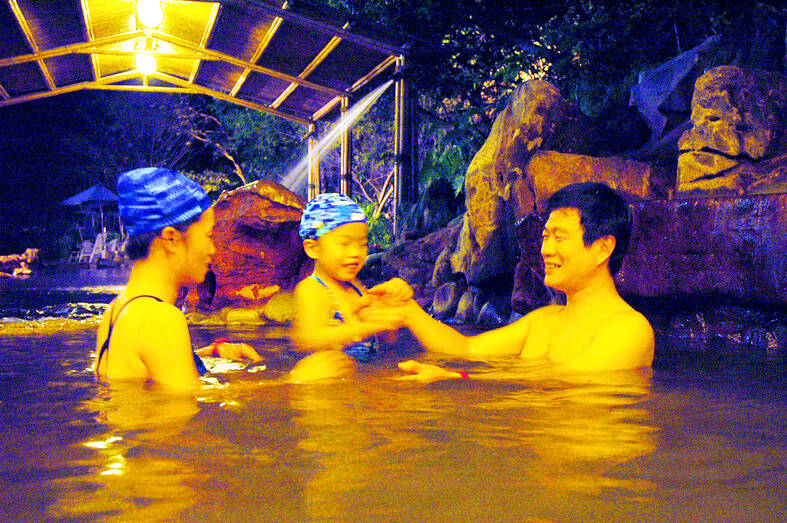People should avoid taking hot spring baths when they are too full or hungry, and remember to control the water’s temperature and to keep warm after getting out of the pool, a doctor said.
Hot spring baths can warm the body and promote blood circulation, but there are a few things to keep in mind, urologist Kao Ming-hung (高銘鴻) wrote on Facebook.
People should avoid taking hot spring baths right after eating, as ingredients that contain alcohol or tend to irritate the stomach could increase one’s heart rate, he said.

Photo: CNA
An increased heart rate and stimulation by the warm waters could raise the risks of a heart attack or stroke, he said.
Taking hot spring baths on an empty stomach is also not recommended, as a low blood pressure could lead to dizziness or other symptoms, he said.
The ideal temperature for hot springs is between 38°C and 42°C to help relax the muscles while avoiding burns, he said.
Kao suggested getting out of the water for a short break after dipping for a maximum of 15 minutes to avoid dehydration or increasing the burden on the heart.
Soaking one’s feet in the hot spring first to test the temperature before immersing one’s body in the pool is recommended, he said.
Elderly people with diabetes or peripheral vascular diseases should not be left alone as they might be less sensitive to temperatures, he said.
The Health Promotion Administration also put forward recommendations on how elderly people and people with cardiovascular diseases can enjoy hot springs.
They should limit bathing time to 15 minutes to avoid acute cardiac disease attacks, as blood vessels in the limbs can dilate in hot water, resulting in a spike in peripheral circulation, the agency said.
They should avoid getting out of the pool too quickly as dilated blood vessels might cause hypotension and lead to fainting, it said.
Patients with chronic diseases should have a companion while bathing in case they need help in an emergency, it said.
Those who have diabetes, high blood pressure and high cholesterol should not bathe in hot springs exceeding 40°C or alternate between hot and cold water, it said.
A large temperature difference would cause rapid relaxation and contraction of blood vessels, it said, adding that sudden vascular contraction could lead to heart attacks or ischemic strokes.
Separately, keeping warm in cold weather is an important protection against blood vessels bursting, nutritionist Emma Liu (劉雅惠) wrote on Facebook.
Blood vessels contract rapidly in cold weather, which could cause blood clots and exacerbate tiredness, headaches and tight shoulders, as well as increase the risk of strokes or heart attacks, she said.
She offered some tips to protect the heart in the cold.
First, avoid salty food such as spicy hotpot soup and processed food, which might cause blood pressure to surge.
Second, avoid oily food, especially those that contain large amounts of saturated fat, such as red meat, fatty meat and skin as fat can cause blood clots to form.
Third, eat enough vegetables as fiber can help reduce cholesterol absorption.
Fourth, eat food rich in Omega-3 fatty acids such as deep-sea fish two to three times per week or take fish oil supplements.

CAUTION: Based on intelligence from the nation’s security agencies, MOFA has cautioned Taiwanese travelers about heightened safety risks in China-friendly countries The Ministry of Foreign Affairs (MOFA) yesterday urged Taiwanese to be aware of their safety when traveling abroad, especially in countries that are friendly to China. China in June last year issued 22 guidelines that allow its courts to try in absentia and sentence to death so-called “diehard” Taiwanese independence activists, even though Chinese courts have no jurisdiction in Taiwan. Late last month, a senior Chinese official gave closed-door instructions to state security units to implement the guidelines in countries friendly to China, a government memo and a senior Taiwan security official said, based on information gathered by Taiwan’s intelligence agency. The

The National Immigration Agency (NIA) said yesterday that it will revoke the dependent-based residence permit of a Chinese social media influencer who reportedly “openly advocated for [China’s] unification through military force” with Taiwan. The Chinese national, identified by her surname Liu (劉), will have her residence permit revoked in accordance with Article 14 of the “Measures for the permission of family- based residence, long-term residence and settlement of people from the Mainland Area in the Taiwan Area,” the NIA said in a news release. The agency explained it received reports that Liu made “unifying Taiwan through military force” statements on her online

Taiwan Semiconductor Manufacturing Co (TSMC), the world’s largest contract chipmaker, said yesterday that it is looking to hire 8,000 people this year, at a time when the tech giant is expanding production capacity to maintain its lead over competitors. To attract talent, TSMC would launch a large-scale recruitment campaign on campuses across Taiwan, where a newly recruited engineer with a master’s degree could expect to receive an average salary of NT$2.2 million (US$60,912), which is much higher than the 2023 national average of NT$709,000 for those in the same category, according to government statistics. TSMC, which accounted for more than 60 percent

Tung Tzu-hsien (童子賢), a Taiwanese businessman and deputy convener of the nation’s National Climate Change Committee, said yesterday that “electrical power is national power” and nuclear energy is “very important to Taiwan.” Tung made the remarks, suggesting that his views do not align with the country’s current official policy of phasing out nuclear energy, at a forum organized by the Taiwan People’s Party titled “Challenges and Prospects of Taiwan’s AI Industry and Energy Policy.” “Taiwan is currently pursuing industries with high added- value and is developing vigorously, and this all requires electricity,” said the chairman